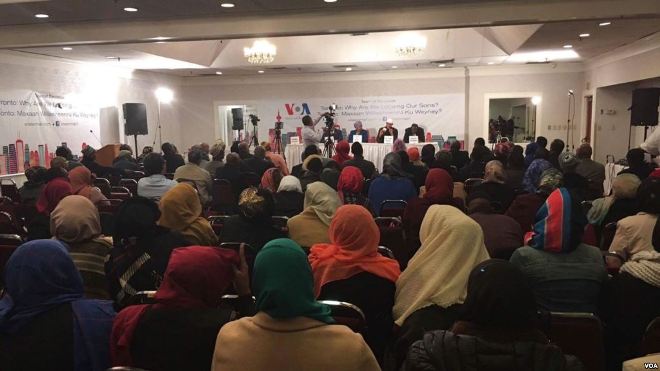
Monday November 13, 2017

Members of the Somali-Canadian community discuss the issue of gang violence at a recent town hall meeting hosted by VOA's Somali Service, in Toronto, Canada.
The Somali community that settled in Canada says poverty and a lack of access to jobs and academic opportunities are some of the factors behind deadly gang violence that has taken a toll on its youth.
More than two dozen young Somali men have died in Alberta because of such violence in the past decade, with gang activity spreading to Toronto as well, officials say.
The Somali-Canadian population discussed the issue of gang-related deaths recently at a town hall forum hosted in Toronto by VOA’s Somali Service. In attendance at the town hall were an Islamic preacher, a woman who lost a son to violence, and two people representing youth and parents in the community. More than 200 people attended, including parents, relatives and friends of the victims of gang violence.
In 1991, a large number of Somalis fleeing war in their east African country settled in a group of residential towers in northwest Toronto.
Cultural challenges
The community has struggled to integrate into Canadian life, but several speakers said the largest impediments are cultural challenges, as well as poverty and a lack of opportunities for Somali youth, panel members said.
Habiba Aden, a cofounder of a Somali group called Positive Change, lost her 26-year-old son Warsame Ali in a double homicide in September 2012 in Toronto. She said she believes cultural challenges and a loss of identity are major issues driving young Somalis toward gang activity.
“Our sons lack paternal role model, and they do not speak their mother language, which forces them struggle with identity crisis,” Aden said.
In Canada, “mothers take the leading role of the family while still struggling with raising more than half a dozen kids. They do not get the same help and cultural co-parenting they would get back home from other family members,” Aden said.
She said she believes those challenges lead families to be less physically affectionate with one another, and eventually drive their sons to outside influences.
Sidiq Ali Hashi, the youth representative on the panel said Somali youth are affected by the socioeconomic status of the community coupled with the influence of the poor neighborhoods they live in.
“I think the reason is the environment where the Somali child is being raised. He grows up in the worst poverty-ridden neighborhoods of Toronto,” Hashi said. He said the neighborhoods where Somali youth live lack investments and good schools.
Because of these challenges, some students drop out of school and fall in with drug dealers and gangs, Hashi said.
Canada, parents blamed
Panelist Sheikh Saeed Rageah, a religious scholar and Imam, said the education system in Canada has failed Somali youth, calling the schools “systematic racism.”
“The education system in this country was designed to segregate us. When the Somali-Muslim child joins the school, he or she is labeled as a child with attention deficit hyperactivity disorder (ADHD or ADD), which deprives them their rights for a fair teaching and homework support,” Rageah said.
However, Saeed Mohamed Mohamud, a parent representative on the panel, said blame belonged not with Canada’s education system but with parents.
“Whatever it is, I think the system in this country was not designed for Somalis. It has been the same since we came here. But I would put the primary blame on a bad parenting of many members within the community,” Mohamud said. “I am a parent. I always see young boys who went to school in the morning, and when they come out hanging out the streets of Toronto with their backpacks. Where are the parents of these boys?”
Some family members had questions for Toronto police, saying many of the homicide cases of slain Somalis remain unsolved.
Toronto police officials said about 40 percent of gang shootings in the city occur in the Toronto neighborhood where Somalis reside.
“We have issues with regards to gang members, drug trade, poverty, lack of opportunity, lack of recreational facilities, inadequate … housing. We have issues with families themselves and the culture that is brought into the community,” Toronto police Superintendent Mario Di Tommaso told VOA.
Di Tommaso said the gangs in Toronto, including those within the Somali community, are based on race, gender and ethnicity.
Community involvement
He said the Toronto police have spent resources to investigate the gang-related shootings and homicides, but he said some blame lies within the community and its lack of reporting such activity.
“We will have many situations where the community at large, not necessarily the Somali community, will make observations, will witnesses something, and they are reluctant to call the police,” Di Tommaso said. “When that happens, you have a proliferation of crimes within that community, which breeds fear.
“We need more witnesses from the community so that we can advance to our investigations,” he added.
At least one parent, Mohamud agreed to a point. He said the community was not happy with how the police and law enforcement agencies handled cases involving the Somali youth, saying, “We have a right that government investigates and tells us who killed our kids, but we also need to collaborate with the law enforcement agencies as well.”
Abdirahman Yabarow, chief of VOA's Somali Service, said the forum was designed to give the Somali-Canadian community a chance to explore, brainstorm and find solutions behind the violence that is affecting their youth.
At the conclusion of the two-hour discussion, panelists proposed an organization aimed at gathering and making available resources for the community. They also urged those in the audience to unite against the influences that are pushing the Somali youth to drug- and gang-related crimes.